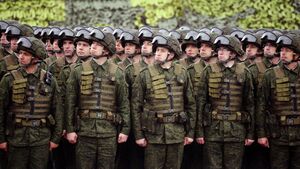Itielia
This article is incomplete because it is pending further input from participants, or it is a work-in-progress by one author. Please comment on this article's talk page to share your input, comments and questions. Note: To contribute to this article, you may need to seek help from the author(s) of this page. |
The People's Republic of Itielia Народна Республика Итъелия | |
|---|---|
| Anthem: "Red Sun Over Azure Sea" | |
| Capital and largest city | Vetromest |
| Official languages | Itielian |
| Ethnic groups (2020) | |
| Religion (2020) |
|
| Demonym(s) | Itielian |
| Government | Unitary Marxist-Leninist single-party socialist republic |
| Roman Tkatshyuk | |
| Ladislav Vedenin | |
| Alexander Stasiuk | |
| Legislature | Supreme People's Council |
| Formation | |
| 1042 | |
| 1938-1940 | |
| 1st June 1940 | |
• Current constitution | 27th October 1997 |
| Area | |
• Total | 1,779,943 km2 (687,240 sq mi) |
• Water (%) | 1,02 |
| Population | |
• 2022 estimate | 88,567,000 |
• 2020 census | 87,105,672 |
• Density | 0/km2 (0.0/sq mi) |
| GDP (PPP) | 2020 estimate |
• Total | $2.629 Trillion |
• Per capita | $30,182 |
| GDP (nominal) | 2020 estimate |
• Total | $801 Billion |
• Per capita | $9,204 |
| Gini (2020) | 29.5 low |
| HDI (2020) | very high |
| Currency | Itielian cervonec (ICR) |
| Time zone | UTCx (+N) |
• Summer (DST) | UTCx (+x) |
| Date format | dd-mm-yyyy |
| Driving side | right |
| Calling code | +54 |
| ISO 3166 code | IT |
| Internet TLD | .itl |
The People's Republic of Itielia (Itielian: Народна Республика Итъелия), commonly known as Itielia (Itielian: Итъелия), is a country The earliest human activity on the territory are known since Late Palaeolithic period.
Itielia is member of N, N, and N.
Etymology
History
Prehistory
Early History
Middle Ages
Early Modern Period
19th Century
Restoration (1893-1932)
Venim Regime and the Second Republic (1932-1938)
Revolution and the Civil War (1938-1940)
20th Century
21st Century
Geography
Climate
Environment
Politics and Government
Itielia is Unitary Marxist-Leninist single-party socialist republic with the leading role of the Communist Party of Itielia enshrined in the constitution. The Government is officially committed to socialism, nevertheless foreign observers have described the government as authoritarian and corporatist.
In the constitution, the Communist Party of Itielia is described as "leading and guiding institution of the people, vanguard of the working masses, highest form of political organisation". The Party holds ultimate authority over state and government, which is itself governed by the Central Committee. Only candidates endorsed by the Party are allowed to contest elections to the Supreme Congress (which are in most cases effectively unopposed). The Party exercises significant political control over all branches of the government, military, and public industry.
Government
Chairman of Presidium of the Supreme People's Council
The Socialist Constitution of the People's Republic of Itielia establishes the Supreme Congress as the highest body of state power. The Congress conveys once a year to decide upon the important matters of policy. It elects the State Council as permanent legislature, which then elects the Council of Ministers. Chairman of the State Council acts as titular head of state. The Chairman of the Council of Ministers (informally referred as Premier) is head of government, who presides over the Council of Ministers made of five deputy premiers and heads of ministries and government departments. The General Secretary ofthe Communist Party of Itielia is de-facto leader of Itielia and leader of the Party. As a rule, General Secretary concurrently holds position of the Chairman of the Council of Defence, making the holder both leader of the party and commander-in-chief.
Military
The Armed Forces of the People's Republic of Itielia, the Domestic Forces, and the People's Militia constitute the military of Itielia. The Armed Forces is composed of the People's Army, the People's Navy, and the People's Air Force. The Law of Itielia establishes compulsory military service for all able-bodies males between the age of 18 and 27. Conscripts are required to serve for two years in the Armed Forces.
The Armed Forces have combined 1,700,000 active duty personnel, and 4,000,000 reserve personnel. The supreme command is assumed by the Council of Defence collectively, and is managed by the Ministry of Defence and the General Staff. In all its operation it is subjugated to civilian government under the leadership of the Communist Party.
In 2020 the military expenditure have reached 2,48 trillion of cervonec, and are continuing to rise. The Government prioriteses both economic growth and military expansion, with the military expanding its focus on precision armament, especially in rocket sphere.
Foreign Relations
Itielia develops foreign relations with all countries regardless of their political or economic system, based on the principle of peaceful co-existance. The important points of foreign policy are security in Western Abos, international trade, global stability, respect of national sovereignty, peace, and mutual development.
Law
Itielian law is based on the civil law system with significant influence of Gagian and Niagaran influences. Before the 80s-90s economic reform, Itielia operated socialist legal system, but with the economic reforms a number of laws passed to reform the Itielian law. The judiciary is operated by professional judges and lawyers and is supervised by the Ministry of Justice and the Party. Trials are inquisitorial and conducted my a mixed panel of professional justices and lay judges elected by local councils.
The basis for law is the Socialist Constitution of the People's Republic of Itielia, passed in 1997. The country operates a complex system of legal norms, passed by various authorities.
Human Rights
International organisations often rate Itielian human rights record as poor. According to International Freedom Report 2020, Itielian Government routinely suppresses freedoms of speech, assembly, the press, religion, and privacy.
According to N, there are currently 34 prisoners of prisoners of conscience in Itielia.
Administrative Divisions
Itielia is divided into 36 districts (okrugs) and 3 Republican cities.
Economy
Primary Sector
Agriculture and Forestry
Minerals
Secondary Sector
Tertiary Sector
Quaternary Sector
Tourism
Energy
Transport
Demographics
Education

The education system consists of pre-school element (crèches and kindergartens), primary and secondary school (Middle School, divided into Junior and Senior Grade, Real School, Gymnasium), upper secondary (High School), and tertiary (universities and college).
Literacy rate is 99.6%, and enrolment for primary school is 100%. The law makes education in primary and secondary institutions compulsory. About 64% of school graduates decide to attend higher education institutions. All Itielian university students are supported by the state, with university-level education having minimal tuition fees. About 41% of Itielian students do not pay tuition fees.
The State has monopoly on education, with private and non-state institutions usually providing tutoring and advanced foreign language instruction.
Ethnicity
Health
The state guarantees access to free healthcare in the Constitution. The state healthcare system is managed by the Ministry of Health. In 2020, Itielia spent 5,2% of GDP on healthcare.
Life expectancy is 74 for women and 72 for men. The leading cause of death in 2020 were diseases the circulatory system. Itielia maintains high standard of hygiene and sanitary quality.
Religion
In 2020 census nearly 56% of surveyed identified themselves as Christians by religion. The majority of Christians belong to the Evangelical Church, a Lutheran church.
The Constitution of Itielia guarantees freedom of consciousness and religious rites. Initially state policy towards religion was purely adversary, with the long term goal of eliminating religion and establishing "scientific atheism" as the only worldview system. This changed with adoption of the Central Committee Resolution "On the Matters of Civil Affairs" in autumn plenum of the Central Committee in 1996, which paved a way for relaxation of religious policy.
Languages
The majority and official language is Itielian, a Northern Venedian language. Itielian is often spoken in different local varieties, and since the enactment of Linguistical Culture Law of 2001, the official policy has been changed to preservation of local dialects. Oratai and Recnyak ethnic communities speak local dialects of Itielian. Argyno-Kipchak ethnic community speaks in Argyno-Kipchak language, a N language.
There are approximately 89 million native Itielian speakers internationally, and 400,000 second language speakers.





